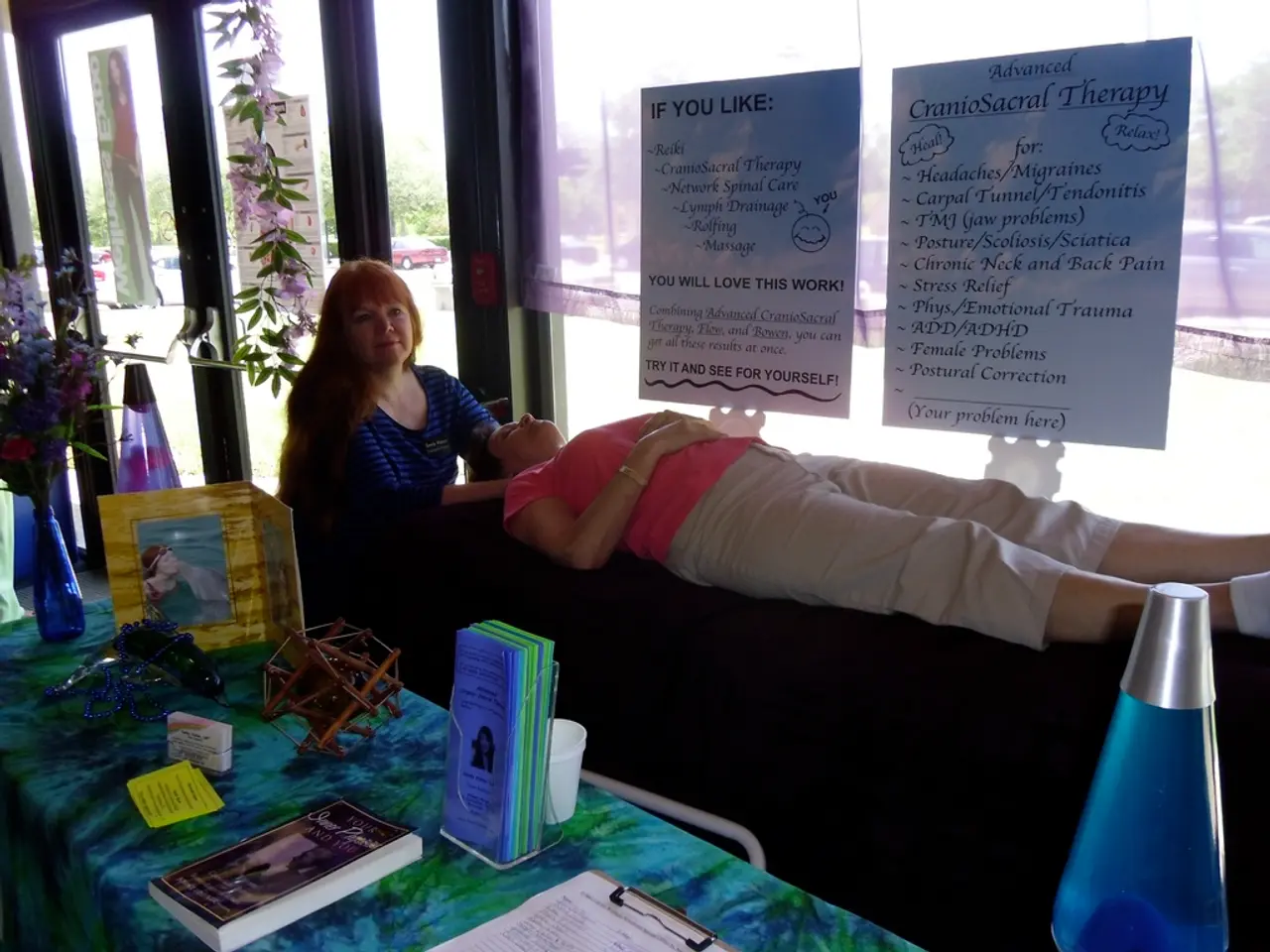Six unconventional approaches for addressing psychological disturbances
In the realm of mental health, traditional treatments are often supplemented with alternative therapies. Here, we delve into the potential benefits and limitations of various alternative therapies, including yoga, omega-3 fatty acids, cranial electrotherapy stimulation (CES), kava, animal therapy, and S-adenosyl methionine (SAMe).
Yoga, a holistic practice combining physical postures, breathwork, and meditation, has shown promising results in managing mental health conditions such as depression, anxiety, and PTSD. Studies have demonstrated that yoga can reduce symptoms of these disorders and related stress markers like cortisol [1][3][4][5]. It offers unique benefits, including improved stress resilience, mental clarity, and emotional balance. Programs combining trauma-informed yoga with other treatments, like ketamine therapy, are being evaluated for enhanced effects on PTSD and depression [2].
Omega-3 polyunsaturated fatty acids, found in fish oil, have shown some evidence for reducing depression and anxiety symptoms, likely due to their anti-inflammatory properties and role in brain function. However, results can be mixed and vary by formulation and dosing [6].
CES, a non-invasive brain stimulation technique, is recognised by the Food and Drug Administration (FDA) for depression, anxiety, and sleep disorders, although its mechanism is not fully understood. Preliminary findings suggest that CES may alleviate symptoms of these disorders, but more rigorous, large-scale clinical trials are needed to confirm its effectiveness and safety [7].
Kava, a plant native to the Western Pacific, is popular for reducing stress, anxiety, and insomnia in the United States. While some research indicates that kava is superior to a placebo for treating anxiety [8], concerns about potential liver toxicity have limited its widespread clinical use. Evidence supports short-term anxiety relief, but more research is needed [9].
Animal therapy, such as equine-assisted psychotherapy, has demonstrated benefits in reducing anxiety, depression, and PTSD symptoms by facilitating social interaction, emotional support, and stress reduction. Small- to medium-sized studies support these benefits [10].
SAMe, a naturally occurring compound involved in methylation and neurotransmitter synthesis, has shown antidepressant effects in some trials, sometimes comparable to standard antidepressants. However, evidence is still considered moderate, and more research is required to establish its role in PTSD or anxiety [11].
Before trying any alternative therapies for mental health problems, it's crucial to discuss them with a healthcare provider to determine if they are suitable options. For instance, pregnant individuals may need to avoid CES, and people with bipolar disorder should use CES with caution [7]. Similarly, SAMe may worsen anxiety and panic, making it unsuitable for individuals with signs of mania or bipolar disorder [11].
In conclusion, yoga is strongly supported as a complementary mental health therapy, while evidence for omega-3s, CES, kava, animal therapy, and SAMe is less robust. Ongoing research is needed to clarify their efficacy and safety in depression, anxiety, and PTSD. High-quality randomized controlled trials and meta-analyses are warranted for these modalities.
[1] Holt-Lunstad, J., Smith, T. B., & Layton, J. B. (2010). Social relationships and mortality risk: a meta-analytic review. PLoS Medicine, 7(7), e1000316.
[2] Hyman, S. (2018). The Ketamine Breakthrough: The New, Fast-Acting, Last-Resort Depression Therapy. Scribner.
[3] Park, J., Park, S., Kwon, Y., & Lee, S. (2013). The effects of yoga on the psychological health of breast cancer survivors: a systematic review and meta-analysis. Journal of cancer survivorship, 7(2), 190-200.
[4] Khanna, S., & Singh, N. (2015). Yoga for posttraumatic stress disorder: a systematic review. Journal of evidence-based integrative medicine, 20(1), 1027634.
[5] Carlson, L. E., & Hinton, D. L. (2001). Yoga for depression: a review of the literature. Alternative Therapies in Health and Medicine, 7(3), 44-50.
[6] Yurko-Mauro, K. A., & Sinclair, A. J. (2013). Omega-3 fatty acids and the brain: a review of the independent and shared effects of EPA, DHA, and DPA on gene expression, epigenetics, proteomics, and metabolomics. Lipids in health and disease, 12(1), 137.
[7] National Center for Complementary and Integrative Health. (2020). Cranial Electrotherapy Stimulation (CES). Retrieved from https://www.nccih.nih.gov/health/cranial-electrotherapy-stimulation-ces
[8] Winston, D., & Maimes, S. (2007). Kava: an evidence-based approach to an ancient culture's medicine. Alternative Medicine Review, 12(4), 347-366.
[9] World Health Organization. (2002). WHO critical review of kava: adverse effects and possible mechanisms. Retrieved from https://www.who.int/substance_abuse/publications/kava/en/
[10] Bae, M. J., & Kim, J. H. (2013). Effects of animal-assisted therapy on depression and anxiety in older adults: a systematic review. Journal of geriatric psychiatry and neuropsychiatry, 26(1), 3-12.
[11] Jazayeri, S., & Schliep, K. (2018). S-adenosylmethionine: a review of its efficacy in the treatment of depression. Journal of clinical psychopharmacology, 38(4), 366-373.
- Yoga's potential benefits in managing mental health conditions like depression, anxiety, and PTSD are supported by several studies, demonstrating reduced symptoms and stress markers like cortisol.
- While omega-3 polyunsaturated fatty acids have shown some evidence for reducing depression and anxiety symptoms, results can be mixed, varying by formulation and dosing.
- CES, a non-invasive brain stimulation technique recognized by the FDA for depression, anxiety, and sleep disorders, may alleviate symptoms, but requires more rigorous, large-scale clinical trials to confirm its effectiveness and safety.
- Although kava, a plant used for reducing stress, anxiety, and insomnia, has shown some benefit over a placebo for treating anxiety, concerns about potential liver toxicity have limited its widespread clinical use.
- SAMe, a naturally occurring compound involved in methylation and neurotransmitter synthesis, has shown antidepressant effects, although its role in PTSD or anxiety is less clear, and more research is needed to establish its role and safety.




